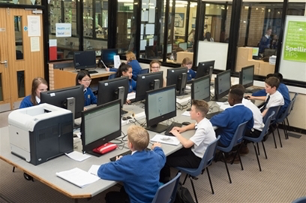In Computer Science we aim to equip students with the skills to participate in a rapidly changing world through challenging and engaging topics. They will develop an understanding and application in the fundamental principles of the subject by having the opportunity to write programs, design webpages and produce professional digital products.
Computing skills are a major factor in enabling students to be confident, creative, and independent learners and it is our intention that they have every opportunity available to allow them to achieve this.
As a team we are committed to upholding and delivering our School's Intent, and we are particularly proud of the way we:
- Are dedicated to ensuring our students progress through the key stages developing valuable skills to fully embrace a future of rapidly advancing computer technology
- Work with students to develop their digital literacy skills and provide challenge in every lesson
- Ensure our students are responsible, competent, confident and creative users of information and communication technology
Key Stage 3
In Key stage 3, our aims are aligned with those of the National Curriculum. Students will be taught to:
- design, use and evaluate computational abstractions that model the state and behaviour of real-world problems and physical systems
- understand several key algorithms that reflect computational thinking [for example, ones for sorting and searching]; use logical reasoning to compare the utility of alternative algorithms for the same problem
- use 2 or more programming languages, at least one of which is textual, to solve a variety of computational problems; make appropriate use of data structures [for example, lists, tables or arrays]; design and develop modular programs that use procedures or functions
- understand simple Boolean logic [for example, AND, OR and NOT] and some of its uses in circuits and programming; understand how numbers can be represented in binary, and be able to carry out simple operations on binary numbers [for example, binary addition, and conversion between binary and decimal]
- understand the hardware and software components that make up computer systems, and how they communicate with one another and with other systems
- understand how instructions are stored and executed within a computer system; understand how data of various types (including text, sounds and pictures) can be represented and manipulated digitally, in the form of binary digits
- undertake creative projects that involve selecting, using, and combining multiple applications, preferably across a range of devices, to achieve challenging goals, including collecting and analysing data and meeting the needs of known users
- create, reuse, revise and repurpose digital artefacts for a given audience, with attention to trustworthiness, design and usability
- understand a range of ways to use technology safely, respectfully, responsibly and securely, including protecting their online identity and privacy; recognise inappropriate content, contact and conduct, and know how to report concerns
We prepare students with the digital skills and online safety knowledge to progress to further studies in Computer Science and for all career pathways.
In Year 7, students complete a Digital Licence certification. They demonstrate their digital literacy skills using Office applications such as Word and PowerPoint, cloud services and searching the web correctly. We also study the impact of technology by delving into the history of computing and finish Year 7 learning programming essentials using a combination of block based and text-based programming languages.
In Year 8, students build upon the skills gained in Year 7 by exploring operating systems and physical components of a computing system. We build on their programming skills by practising the basics of a text-based programming language and also applying this to web development.
In Year 9, students learn about cyber security threats and how to prevent attacks on systems and their personal data. We also look at how data can be used by companies to inform advertising and other choices. Students also explore how visual and audio effects are represented using binary.
Key Stage 4
All students have the opportunity to study aspects of Information Technology and Computer Science at sufficient depth to allow them to progress to higher levels of study or to a professional career.
All students are taught to:
- develop their capability, creativity and knowledge in computer science, digital media and information technology
- develop and apply their analytic, problem-solving, design, and computational thinking skills
- understand how changes in technology affect safety, including new ways to protect their online privacy and identity, and how to report a range of concerns
Students follow the OCR J277 Specification for Computer Science. The full specification can be found here: OCR J277 Specification
At A Level, students study OCR H446 Computer Science. Further information can be found here.
Students will be inspired, motivated and challenged by following a broad, coherent, practical, satisfying and challenging course of study. The course provides insight into, and experience of how computer science works, stimulating students’ curiosity and encouraging them to engage with computer science in their everyday lives and to make informed choices about further study or career choices.
Enrichment Opportunities
- Visit to Bletchley Park
- Cyber Security competitions
- Raspberry pi projects
- Coding Club
- Oxford University Computational thinking challenge
- Computing Society
- Workshops with Universities/Colleges
- Outside speakers
The Computer Science Team
- Mrs H Page - Head of Subject
- Mrs C Campbell
- Mr R Smith
- Mr J White
- Mrs R Williams

